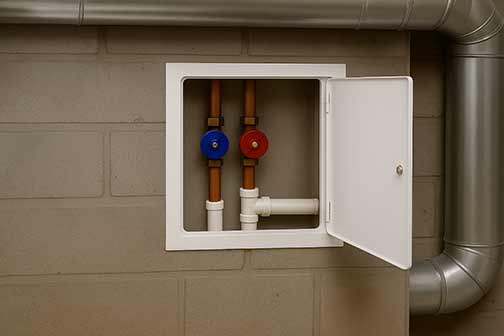
Basements often house important systems like plumbing pipes, electrical wiring, and HVAC ducts. When everything runs smoothly, these hidden components can be easy to forget. But when a problem arises, it could cause frustration, damage, and costly repairs.
The struggle to get to a leaking pipe or a faulty damper without tearing into the structure is one many professionals know all too well. General-purpose access doors help avoid this struggle.
These access solutions facilitate maintenance and repairs, ensuring the long-term health and efficiency of a building’s infrastructure.
Understanding General-Purpose Access Doors
General-purpose access doors are panels installed in walls, ceilings, or floors that provide easy entry to hidden areas. These doors are designed to give access to plumbing, HVAC systems, electrical wiring, or other concealed utilities.
They come in various materials—commonly metal or high-impact plastic—and are available in different sizes to suit multiple needs.
One of the best things about general-purpose access doors is their versatility. They can be installed in drywall, masonry, concrete, and even ceilings, making them especially useful in basement environments where systems are often built behind or inside walls.
Common Basement Risks To Plumbing and HVAC Systems
Basements are more prone to certain risks, especially when systems are hidden behind walls or ceilings.
- Moisture and Water Intrusion: Basements are often the first to experience leaks or flooding. Poor drainage, heavy rainfall, or plumbing failures can cause water to pool or seep into important areas. When plumbing or HVAC systems are not easily accessible, these issues can escalate quickly.
- Limited Access and Visibility: Many basements have systems hidden behind walls or above drop ceilings. Routine inspections are skipped or delayed without proper access, allowing wear and tear to go unnoticed.
- Pest Infestations and Debris Buildup: Pipes and ductwork that aren’t sealed or protected can become entry points for rodents and insects. Over time, debris can also gather, clogging systems and reducing performance.
- Temperature Extremes: Basements can experience both hot and cold extremes, especially when ventilation is poor. This can lead to frozen and burst pipe emergencies, condensation, or overheating, causing system stress and long-term damage.
How General-Purpose Access Doors Offer Protection
Universal access doors and panels offer a designated entry point for maintenance, bringing many benefits.
Stopping Small Issues Before They Escalate
A minor issue that goes unnoticed can quickly turn into a major problem. For instance, a small leak in a pipe can go undetected for months when hidden behind a basement wall. During that time, the dampness could cause mold growth, rot, and serious structural damage.
General-purpose access doors change this dynamic.
They encourage more frequent, proactive inspections because they make access easy and non-disruptive. A quick check can reveal an issue in its earliest stages, allowing for a swift and inexpensive fix.
Streamlining Maintenance and Reducing Downtime
Routine maintenance is important for the longevity of any plumbing or HVAC system. Tasks like changing filters, lubricating pumps, or checking gauges are necessary but can become difficult without proper access.
Access doors transform these tasks from a major chore into a quick, routine operation.
A technician can simply open the door, perform the necessary work, and close it, with minimal disruption to the surrounding area or the people in the building. This level of efficiency means less downtime for important systems, ensuring the building’s comfort and functionality remain uninterrupted.
It also translates to predictable maintenance schedules and fewer tenant complaints for building managers.
Forming a Barrier Against Dirt and Damage
Basements and utility rooms are often busy spaces, acting as hubs for storage or mechanical equipment. They can be a harsh environment for delicate systems, with potential for dust, dirt, moisture, and accidental impact.
All-purpose access doors act as a physical shield. They seal off the cavity behind the wall, keeping dust, dirt, and debris from contaminating sensitive HVAC parts and plumbing connections.
They’re also made from durable metals like steel, protecting plumbing valves from moisture. This type of protection helps maintain the system’s efficiency and cleanliness.
Some doors even come with airtight seals and insulation, which further helps prevent energy loss and maintain a consistent environment for the systems they protect.
Saving Time and Money
Installing universal access doors has long-term financial benefits. While they represent a small initial investment, their savings over a building’s life are substantial.
The core financial logic is simple: a small, upfront cost prevents many larger, more expensive performance problems down the line.
These doors help you avoid potentially high costs by enabling easy access for early detection and proactive maintenance. Such costs include demolishing and repairing walls, removing mold, and replacing failed systems.
Improved maintenance also enhances operating efficiency, lowering utility costs over time.
Keeping the Basement Safe and Neat
Beyond their practical benefits, access doors also contribute to a space’s appearance. They cover unsightly pipes, wires, and ducts, giving a basement or utility area a cleaner, more organized, and professional look.
Furthermore, these doors are a key safety feature. They prevent people from accidentally bumping into hot pipes, sharp metal components, or exposed electrical wiring.
They also have locking mechanisms that discourage unauthorized tampering with vital infrastructure, ensuring that only qualified personnel can access and interact with the systems.
Complying With Building Codes
Many building codes require systems to be accessible for regular inspections and repairs. General-purpose access doors help meet these requirements and make passing inspections much easier. This is especially true for older buildings with retrofitted systems.
Conclusion
Basements may be out of sight, but they should never be out of mind, especially when they house vital plumbing and HVAC systems.
General-purpose access doors offer a practical, affordable way to protect these systems by improving access, reducing risks, and simplifying maintenance.
Whether planning a new build or upgrading an older structure, adding these doors in key areas can help prevent costly issues and improve long-term reliability.

